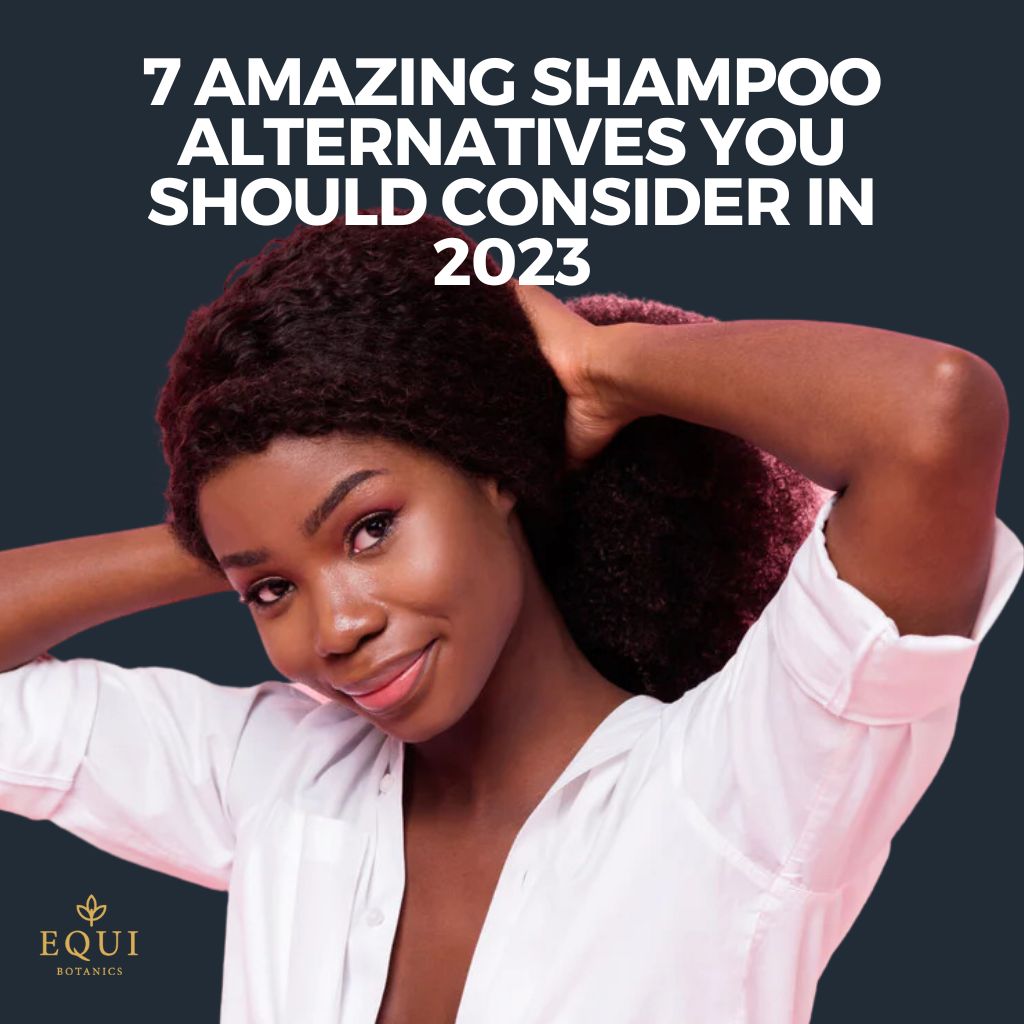
Looking for a hair cleanser that doesn't harm your locks or the planet? While shampoo is a popular choice, many formulations contain chemicals that can be less than healthy for your hair. Discovering alternative methods for a more environmentally friendly hair wash can be a challenge so we’ve found the best ones for you. Keep reading!
Key Summary
- Traditional shampoos can contain chemicals that are damaging to the hair and scalp.
- Alternative methods offer benefits such as: retaining natural oils, minimising damage, reducing chemical exposure, and promoting scalp and hair health.
- Natural alternatives include: co-washing, baking soda and apple cider vinegar rinses, water-only washing, natural oil cleansers, herbal shampoo bars, and rice water rinses.
- Consider using naturally-derived, vegan, and cruelty-free shampoos if you prefer to stick with traditional shampooing.
- Transition periods vary – it can take a few weeks to a few months for your hair to adjust to alternative methods.
Is it Good to Wash Hair without Shampoo?

Washing hair without shampoo, also known as the no-poo method, can be a beneficial choice for many individuals. Traditional shampoos often contain sulphates and other harsh chemicals that can strip natural oils from the hair, leading to dryness and potential damage.
Using alternatives to shampoo to wash your locks can help to maintain a healthy scalp and hair as well as reduce your exposure to toxic ingredients. Other key benefits of washing hair without shampoo include:
- Retains natural oils and improves hair health
- Minimises damage
- Reduced chemical exposure
- Sustainable and environmentally friendly
- Increased hair shine
- Reduced product buildup
- Promotes natural hair texture
- Reduces hair frizz
- Supports scalp health
Of course, alternative methods aren’t for everyone as hair types and individual preferences can vary, so it's essential to experiment and find the method that suits you best.
If you find that you prefer to use a shampoo, then you could switch to a naturally-derived, vegan and cruelty-free formulation instead that doesn’t contain chemical ingredients, such as the Baobab Hair Detangler & Cleanser.
Baobab Hair Detangler & Cleanser
We prefer to avoid calling this a detangling shampoo. Instead, we call ours a detangling cleanser because it’s softening and moisturising while cleansing thoroughly. It also acts as your pre-poo detangler before you wash. Are you tired of that stripped feeling after you’ve just washed your hair? Wash your hair not strip it of its natural oils.
What to Use Instead of Shampoo | 6 Alternatives

1. Co-Washing
Co-washing, short for conditioner washing, is a gentle alternative to traditional shampooing and is popular amongst those adopting the no-poo approach. Instead of using a shampoo, co-washing involves using a silicone-free conditioner to cleanse the hair and scalp.
This method is particularly beneficial for individuals with dry or curly hair, as it helps retain natural oils with studies even showing that it can reduce frizz.
2. Baking Soda and Apple Cider Vinegar Rinse
For those seeking a budget-friendly, natural hair wash option, a baking soda and apple cider vinegar rinse can work wonders. Baking soda helps remove buildup and clarify the scalp, while apple cider vinegar restores the hair's pH balance.
To use this method, create a paste using baking soda and water, apply it to the scalp, and rinse thoroughly. Follow up with a mixture of apple cider vinegar and water to condition the hair. It’s important to remember to dilute the vinegar to prevent scalp irritation.
3. Water-Only Washing
The no-poo water-only way of washing involves rinsing the hair thoroughly with warm water to remove dirt and excess oils. While this method may take some adjustment period for your scalp to regulate oil production, it can result in healthier, less greasy hair over time.
Massaging the scalp during water-only washing helps distribute natural oils and stimulate blood flow, promoting a healthier scalp.
4. Natural Oil Cleansers
There are a wide range of natural ingredients that can act as cleansers to the hair and scalp. Some of the most effective ones include:
Aloe Vera Gel
Aloe vera gel has soothing and moisturising properties, making it an excellent natural cleanser for the scalp that is also effective for treating dandruff and promoting hair growth. Apply a small amount of pure aloe vera gel to your scalp and gently massage it in. Leave it on for a few minutes before rinsing thoroughly.
Babassu Oil
Babassu oil is lightweight with excellent emollient and cleansing properties. It helps to remove excess oil and buildup from the hair and scalp without stripping away natural moisture, leaving the hair hydrated, shiny, and clean without shampoo.
Tea Tree Oil
Tea tree oil contains antimicrobial properties that can help to treat various scalp issues, such as dandruff, itchiness, and fungal infections. Add a few drops of tea tree oil to water and use as a scalp rinse.
Marula Oil
Marula oil is a lightweight oil that’s rich in antioxidants and fatty acids. While it’s more commonly known for its moisturising and nourishing properties, it also has cleansing abilities, helping to remove dirt and impurities from the hair and scalp.
Baobab Oil
Baobab oil helps to add moisture to the hair and scalp while providing a gentle cleansing effect. It can also help to maintain scalp health and leave the hair feeling soft and manageable.
5. Herbal Shampoo Bars
Shampoo bars have gained popularity as an eco-friendly alternative to traditional liquid shampoos. They are typically made with natural ingredients and are free from harsh chemicals. Look for shampoo bars infused with herbs like lavender, chamomile or rosemary, which offer additional benefits for your hair and scalp.
6. Rice Water Rinse
Rice water has gained popularity as a natural shampoo alternative due to its nourishing and strengthening properties. Rice water rinses are rich in vitamins, minerals, and amino acids that promote healthy hair growth, strengthen the hair strands, and improve overall hair texture.
Follow our step-by-step on how to make a rice water rinse to wash your hair instead of shampoo:
- Rinse half a cup of rice to remove any impurities.
- Place the rinsed rice in a bowl or container and cover it with water.
- Let the rice soak for about 30 minutes, stirring occasionally.
- After 30 minutes have elapsed, strain the rice and collect the water in a clean container.
- Apply to your hair, massaging it into the scalp and working through the strands. Leave it on for 5-10 minutes and then rinse.
If you’d prefer to use a pre-made rice water, then try the Rice Water & Green Tea Hair Tonic which combines the benefits of rice water with other botanical extracts to nourish, refresh and revitalise your hair.
Rice Water and Green Tea Hair Tonic and Detangler
The Rice Water and Green Tea Hair tonic is jam-packed with natural, detangling and hydrating botanicals for refreshing hair daily. It is very effective on gym days when the hair is dried out from sweat so you can feel confident after a workout. The Rice Water and Green Tea hair tonic is also effective when used for detangling hair on wash days to save hours before applying the cleanser.
Is There any Reason to Avoid the No-Poo Method?
While the no-poo movement offers several benefits, it may not be suitable for everyone. In particular, those with certain scalp conditions, such as excessive dandruff or seborrheic dermatitis, may find that the no-poo method does not effectively address these issues.
Traditional shampoos often contain active ingredients specifically formulated to target such conditions, and eliminating shampoo altogether may exacerbate the problem. In such cases, consulting with a dermatologist or trichologist is recommended to find a suitable, more natural approach.
Those with oily hair may also initially find it challenging to adjust to the no-poo method. It can take some time for the scalp to regulate oil production, and during the transition period, the hair may appear greasy. Regular scalp massages and researching proper cleansing techniques, will help to balance the scalp’s oil production, resulting in less greasy hair over time.
Frequently Asked Questions (FAQs)
Can I Use These Alternatives if I Have a Sensitive Scalp?
Some of the alternatives mentioned, such as herbal rinses and rice water, can be gentle on the scalp, however, everyone's sensitivity levels differ, so it's important to perform a patch test and monitor your scalp's reaction when trying new methods.
Can These Shampoo Alternatives Remove Heavy Product Buildup?
Some alternatives, such as baking soda and apple cider vinegar rinse or herbal rinses, can help remove product buildup to a certain extent but, for heavy product buildup, you may need to incorporate clarifying shampoos.
How Long Does the Transition Period to Using These Alternatives Typically Take?
The transition period can vary from person to person as when switching from traditional shampoos to alternative methods, your scalp may need time to adjust. It can take a few weeks to a few months for your hair to regulate its oil production and for you to see the full benefits of these alternatives.
Can I Combine These Alternatives With Traditional Shampooing?
Yes, you can certainly combine these alternatives with traditional shampooing if it suits your hair care routine. Feel free to experiment and find a balance that works best for you.
Are These Alternatives Safe for Colour-Treated Hair?
While some alternatives may be gentle on colour-treated hair, it's important to note that they may not provide the same colour-preserving properties as specialised colour-care shampoos. If you have colour-treated hair, consult with your hairstylist who will be able to recommend alternatives.
Conclusion
Finding alternatives to shampoo that are as effective and give you the same results can be difficult but the benefits to switching to the no-poo method are clear to see. Natural shampoo alternatives support hair and scalp health whilst ensuring you are left with squeaky clean locks. Be patient and trust the process to get some seriously shiny, healthy hair!


